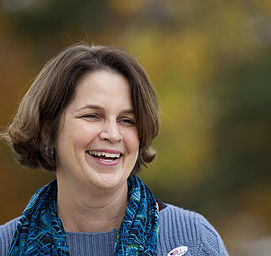House Dems Organize Effort to Get Constituents to Vote by Mail
With less than 90 days until the Nov. 3 election, Democrats in Maryland’s House of Delegates are making a concerted effort to get their constituents to vote by mail.
Marylanders will have the option to vote at large centers across the state during the upcoming election, but House Democratic Caucus Chair Jazz M. Lewis (D-Prince George’s) and Vice-Chair M. Courtney Watson (D-Howard) are leading an effort to get voters to apply for mail-in ballots instead of waiting in line in November.
Watson said she called roughly 600 voters before setting up the caucus outreach program, and found more than half of them didn’t realize they had to apply for a mail-in ballot.
“That sort of put us all on high alert, because we know that this is a fundamental right in our democracy,” Watson said, “and we can’t really stomach the thought of citizens not being able to vote in an election because they didn’t know they had to order a ballot, and they don’t want to expose themselves to the pandemic by voting in person.”

Del. Courtney M. Watson (D-Howard)
Voters automatically received mail-in ballots during the state’s June 2 primary, but Gov. Lawrence J. Hogan Jr. (R) subsequently ordered a more traditional election for November. Hogan’s plan calls for every voter to receive an application for a mail-in ballot instead of automatically getting one like in June.
Lewis and Watson worry that voters across the state will be confused when they receive an application instead of a ballot. The duo provided House Democrats with a slew of educational materials for voters, including videos and the ballot applications themselves.
A chorus of Democratic lawmakers, local election officials and voting rights advocates have since demanded that Hogan reverse course and conduct the election entirely by mail. Lewis and Watson say they still strongly support a mail-in election – but hope to reduce the number of in-person voters through outreach to constituents.
“The data suggests that the safest thing for us to do is mail-in voting,” Lewis said. “We have taken it upon ourselves within the House Caucus under Speaker (Adrienne A.) Jones’ leadership, to call voters and just handle the confusion.”
If Marylanders don’t vote by mail, they’ll have the option to cast their ballot during eight days of early voting at voting centers across the state. At least 360 voting centers will be open on Election Day, according to the State Board of Elections’ most recent plan, although state officials hope local boards of elections will pull together even more locations.
Lewis and Watson fret that the coronavirus pandemic will dissuade many voters from heading out to the polls on Election Day. They’ve found that some voters want a mail-in ballot, but just aren’t prepared to request one by themselves.
Watson recounted walking an 80-year-old constituent through the State Board of Elections’ online application process. She said some voters have even volunteered to aid lawmakers in helping people request mail-in ballots.
“It’s a very complicated process,” Watson said. “People need help, and they’re grateful that we’re calling them.”
Lewis and Watson hope caucus members’ outreach will help protect those most vulnerable to COVID-19. House Democrats are providing retirement homes across the state with information about how to request mail-in ballots.

Del. Jazz M. Lewis (D-Prince George’s)
“I think we’re trying to do all the planning and prep work of educating people that they have other options, so that we don’t risk their safety,” Lewis said. “Right now, there’s a lot of confusion with the decision to govern.”
He said caucus members are also encouraging young people to become election judges. Local boards of elections are currently assessing the number of election judges they need after state election officials ordered larger and fewer voting centers.
The Democrats’ outreach will shift toward educating voters about how to submit mail-in ballots at drop-off boxes as the election draws closer, Lewis and Watson said. They emphasized that, despite the concerted Democratic effort to get voters to use mail-in ballots, there is no evidence that vote-by-mail elections benefit any particular party.
The State Board of Elections is also planning a multi-million-dollar outreach to voters as the election approaches, according to Nikki Charlson, the state’s deputy election administrator. She said the state plans to encourage voters to request mail-in ballots up until the Oct. 20 deadline, and will shift toward educating voters on how to submit their ballots as Election Day approaches.
Charlson described the state’s upcoming voter education effort as a “multi-week, multi-message campaign.” Election officials previously requested an additional $4 million for voter education as part of the election.
State Board of Elections Vice Chairman Patrick J. Hogan (D) said he welcomes Lewis’ and Watson’s voter education efforts. Hogan said he hopes every state legislator, regardless of party affiliation, will reach out to their constituents about the November election.
“Legislators tend to be in constant communication with their constituents,” Vice-Chairman Hogan said.




 Creative Commons Attribution
Creative Commons Attribution